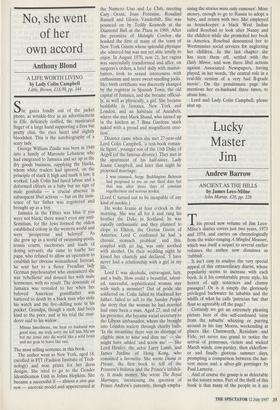No, she went of her own accord
Anthony Blond
A LIFE WORTH LIVING by Lady Colin Campbell Little, Brown, £18.99, pp. 344 She gazes fondly out of the jacket photo, as wrinkle-free as an advertisement in Elle, delicately coiffed, the manicured finger of a large hand supporting a firm but pretty chin, the eyes hazel and slightly bloodshot. This is the autobiography of a scary lady. George William Ziadie was born in 1949 into a family of Maronite Lebanese who had emigrated to Jamaica and set up in the dry goods business, supplying the blacks, whom white traders had ignored, on the principle of stack it high and mark it low; it worked. Lady Colin had fused labiae and a deformed clitoris as a baby but no sign of male genitalia — a crucial absence in subsequent libel actions — but on the insis- tence of her father was registered and brought up as a boy. Jamaica in the Fifties was bliss if you were not black; there wasn't even any anti- Semitism, for the Jews formed the oldest established colony in the western world and were 'prosperous and beloved'. As she grew up in a world of swimming-pools, tennis courts, racehorses and loads of doting servants, she came to loathe her papa, who refused to allow an operation to establish her obvious womanhood. Instead, he sent her to a fierce Freudian lady German psychoanalyst who announced she was 'rebellious' and doused her with male hormones, with no result. The downside of Jamaica was revealed to her when her beloved American grandfather was battered to death by a black man who stole his watch and the five-shilling note in his pocket. Grandpa, though a snob, had been kind to the poor, and at his trial the mur- derer said to his widow:
Missus Smedmore, me hear yo husband was good man, me truly sorry me kill him Ma'am but me come into dis world like a wild beast and me goin to leave like one.
The most telling sentence in this book. The author went to New York, aged 18, enrolled in FIT (Fashion Institute of Tech- nology) and won prizes for her dress designs. She tried to go to the Gender Identification Unit in Johns Hopkins. She became a successful if — almost a sine qua non — anorexic model and uppercrusted at the Numero Uno and Le Club, meeting Cary Grant, Joan Fontaine, Rosalind Russell and Gloria Vanderbilt. She was pounced on by Teddy Kennedy at the Diamond Ball at the Plaza in 1969. After the premiere of Midnight Cowboy she hooked the first of many of the team of New York Giants whose splendid physique she admired but was not yet able totally to enjoy. In August 1970, now 21, her vagina was successfully transformed and after, on surgeon's orders, a brief dally with mastur- bation, took to sexual intercourse with enthusiasm and more sweet-smelling jocks. Her birth certificate was discreetly changed by the registrar in Spanish Town, the old capital of Jamaica, and she became official- ly, as well as physically, a girl. She became beddable in Jamaica, New York and London, and an habituee of Annabels, where she met Mark Shand, who turned up in the kitchen at 7 Bina Gardens 'stark naked with a proud and magnificent erec- tion'.
Disaster came when she met 27-year-old Lord Colin Campbell, 'a text-book roman- tic figure', younger son of the 11th Duke of Argyll (of the famous divorce). They met in the apartment of his half-sister, Lady Jeanie Campbell, and later that night he proposed marriage: I was stunned. Serge Beddington Behrens had proposed to me on our third date but that was after three days of constant togetherness and serious nookie.
(Lord C turned out to be incapable of any kind of nookie.) He woke Jeanie at four o'clock in the morning. She was all for it and rang his brother the Duke in Scotland; he was equally enthusiastic and they planned to elope to Elkton, the Gretna Green of America. Lord C confessed he had 'a chronic stomach problem' and this, coupled with jet lag, was only soothed with alcohol. On their wedding night he kissed her chastely and declared, 'I have never had a relationship with a girl in my life.'
Lord C was alcoholic, extravagant, lazy, and a bully. How could a beautiful, talent- ed, successful, sophisticated woman stay with such a monster? Out of pride she soldiered on. Colin failed to blackmail her father, failed to sell to the Sunday People the story that the woman he had married had once been a man. Aged 27, and rid of his presence, she became social secretary to the Libyan ambassador, whom she brought into London society through charity balls. `In the meantime there was no shortage of eligible men to wine and dine me' — she might have added 'and screw me' — like Lord Henley, the actor Larry Lamb, and James Jardine of Hong Kong, who remained a favourite. She wrote Diana in Private, the first book to tell of the Princess's bulimia and the Prince's infideli- ty. It made money. She wrote The Royal Marriages, 'mentioning the question of Prince Andrew's paternity, though empha- sising the stories were only rumours'. More money, enough to go to Russia to adopt a baby, and return with two. She employed as housekeeper a black West Indian called Rosebud to look after Nanny and the children while she promoted her book in America. Rosebud denounced her to Westminster social services for neglecting her children. In the last chapter she has seen them off, settled with the Daily Mirror, and won three libel actions against Associated Newspapers, having played, in her words, 'the central role in a real-life version of a very bad B-grade movie'. On the penultimate page she mentions her ex-husband three times, to abuse him.
Lord and Lady Colin Campbell, please shut up.


























































 Previous page
Previous page